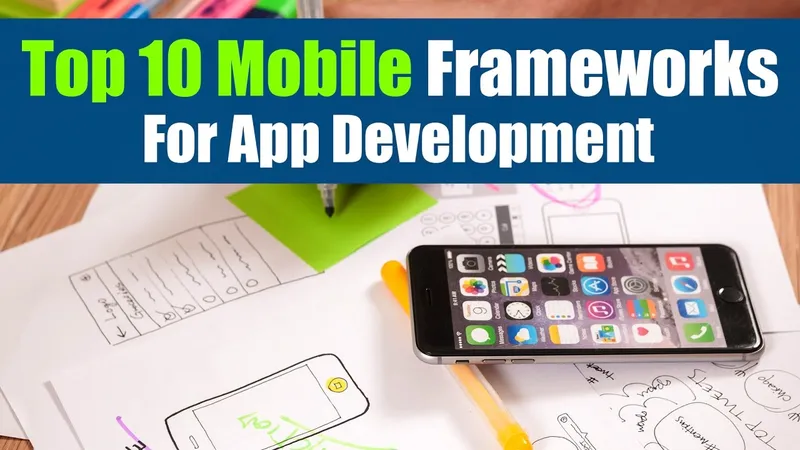

Top 10 Mobile App Development Frameworks in 2020

With an increasing number of smartphone users across the world, a lot of entrepreneurs are focussed on developing mobile apps for their businesses. By gaining a notable momentum in the tech-savvy world, the mobile application development market has achieved an unparalleled CAGR of around 14.3% and is expected to reach 100 Billion USD by the end of 2022.
Thanks to the rising market penetration by mobile phones and the availability of various mobile app development frameworks, reaching the target audience through an intuitive mobile app is not a big deal anymore. Intending to deliver a striking user experience over a few finger taps, a custom mobile app within a limited budget is what a business needs. However, choosing the ideal mobile app development framework with an apt development strategy is very crucial as this can literally make or break the entire success of your app.
Here’s a list of the popular mobile app development frameworks that can help you build a successful mobile app and seamlessly implement your innovative business strategies:
Ionic
Being one of the most popular mobile app frameworks for building interactive and intuitive mobile applications, Ionic is a free and open-source platform that is preferred by most of the mobile app developers. By offering premium and best-in-class services for creating custom mobile applications for web, Android, and iOS, this framework comes with some significant advantages like default elements for filters, navigation bars, menu tabs, forms, action sheets, and more. In fact, using an Ionic framework gets more easy and manageable for those developers having proficiency in HTML, CSS, or JavaScript.
PhoneGap
Being popularly known as Apache Cordova, this open-source and flexible mobile development framework empowers the programmers to develop a mobile application that can be further installed as a native app across various devices. By leveraging HTML5, JavaScript, as well as CSS3 for cross-platform app development, this top-notch framework enables the developers to work without any restrictions related to hardware. Using this exceptional framework, it gets easy to develop mobile apps for all the major operating systems, be it Android, iOS, or any other ones. While in case of any alterations, PhoneGap lets the developers to view it instinctively.
Xamarin
Rated as one of the topmost frameworks for mobile app development, Xamarin is an open-source, cross-platform app development framework that provides entrepreneurs with a precise and intelligent way to build an app for their business. Leveraging a technology backed by Microsoft, this reliable framework is considered to provide a flexible native performance that empowers the businesses to deliver a world-class user experience to their customers. Following a different approach than the other mobile app development frameworks, Xamarin is supported by various tools and programming languages which makes it an ideal choice for cross-platform app development.
React Native
Being one of the widely used frameworks for developing Android and iOS applications, React Native is an open-source and cross-platform framework powered by the social media pioneer, Facebook. Based on Javascript and ReactJS, this framework empowers the mobile app developers to create custom innovative apps in short development cycles as well as quick deployment timelines. Also, leveraging a language called JSX (Javascript-XML), it simplifies the process of development as the programmers don’t need to learn complex languages anymore.
Corona SDK
An open-source development framework that is known to develop cross-platform mobile apps in a minimum timeframe, Corona SDK empowers businesses with high-performance applications based on a solitary codebase. Due to the flexibility and ease of use offered by Lua (a programming language that supports Corona), this framework works exceptionally well with different platforms like Android, iOS, and Nook. For those looking to code at a high speed without degrading the quality of their mobile app, Corona SDK can be the ideal choice.
jQuery Mobile
An HTML5 based cross-browser framework, jQuery comes with a ready-to-use JavaScript library which makes it support a myriad of operating systems like Windows, Firefox, Mac OS, Kindle, Blackberry and more. Being a concise framework comprising various plugins like Content Slider, Pop-Up Boxes, and Image Slider, jQuery plays a pivotal role in simplifying web pages by making them interactive, appealing, and user-friendly. Coming with a single code version, this framework seamlessly runs across multiple devices which makes it stand apart from others.
Flutter
Launched by Google, Flutter is an open-source mobile app SDK that ensures a convenient development process through a single code base for both iOS and Android. With an added advantage of creating new widgets and modifying the existing ones, the responsive mobile applications powered by Flutter help the app developers to effortlessly engage their target audience. Also, the use of an exemplary 2D graphics engine named Skia, this software development kit enables the programmers to deliver a truly-native feel.
Intel XDK
Being a cross-platform mobile application development framework, Intel XDK can help programmers to build interactive and engaging apps for all the devices. Powered with HTML5 and JavaScript, this framework involves a single code base which makes it an ideal fit for Android, iOS, Windows, Nook, and Amazon. Moreover, its drag-and-drop user interface and the support for futuristic technologies like IoT makes Intel XDK a preferred choice of framework among most of the developers.
Mobile Angular UI
A magical and exceptional fusion of AngularJS, HTML5, and Bootstrap, Mobile Angular UI is well-known for streamlining the process of mobile app development. With an aim to deliver a best-in-class mobile experience to the users, this structural framework comprises many useful components like switches, sidebars, scrollable areas, and overlays. With fastclick.js and overthrow.js being its prime libraries, this framework is an ideal fit for modern-day mobile and web applications.
Appcelerator Titanium
For those looking to create native or hybrid mobile apps using a single JavaScript codebase, Appcelerator Titanium is the ideal choice of framework. By leveraging independent APIs to seamlessly access the hardware components of the mobile device, this cross-platform framework empowers programmers to deliver a world-class experience to the users.
As the mobile application development is evolving at a rapid rate, it’s time to focus on their dedicated frameworks available in the market. Being a driving factor behind the development of a mobile app, the choice of framework usually depends on numerous factors like operating systems, budget, time period, and more. For those looking to maximize their business outcomes with the ideal framework for their app, consulting a reliable mobile app development company could help.





